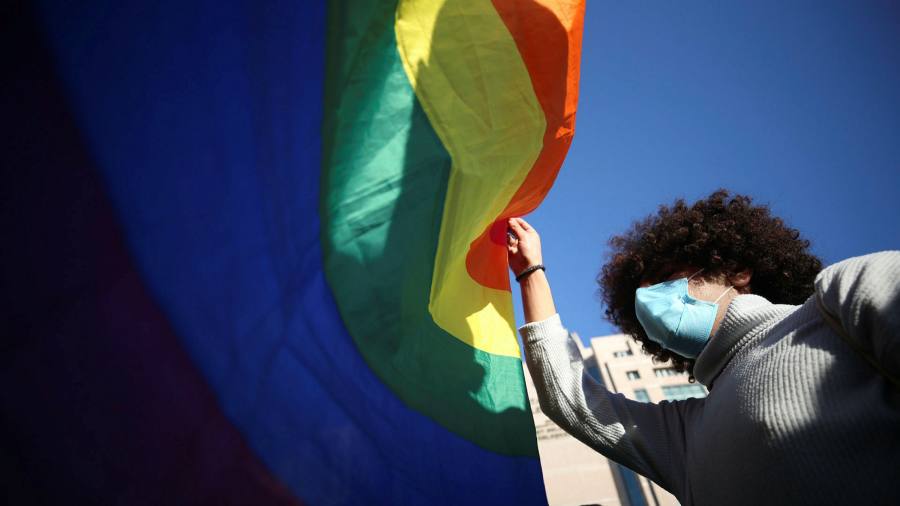[ad_1]
As he joined an intense week of protests at Istanbul’s Bogazici University, Enes Gozukucuk contemplated how much he had changed since joining one of Turkey’s most prestigious academic institutions.
Born to devout religious parents, he was, in his own words “homophobic†and “not so open-minded†on racial and ethnic equality. But this week he was on the front line of demonstrations opposed to the appointment of a government-chosen rector who has been accused of targeting LGBT freedoms.
“This university taught me how to be a good person, to respect other people no matter what,†said the 23-year-old. “This is why I’m protesting now. This university should stay like this. Turkey needs people like us.â€
Protests have simmered at Bogazici’s central Istanbul campus since early January when President Recep Tayyip Erdogan announced the appointment of Melih Bulu, a failed ruling party candidate, as the new head of the university.
More than 150 people were arrested on Monday as hundreds of students from Bogazici and elsewhere gathered for their fifth successive week of demonstrations. Further arrests followed in subsequent days at solidarity protests that rippled through Turkish cities.
Such public outpourings of discontent are rare in Turkey, where the government has become increasingly intolerant of demonstrations in recent years.Â
Atilla Yesilada, an Istanbul-based political analyst at the GlobalSource Partners consultancy, is watching to see if they gain momentum. “The length of these protests — and the government’s attitude — dispels one of the biggest fears of secular, urban, well-heeled opposition voters,†he explained. “This perception that if we go out on to the streets we’re going to be decimated is disappearing each day.
“This raises the odds of other groups, either in sympathy to Bogazici or for their own reasons, will stage demos.â€
The protests began days into the new year after Erdogan, who in 2016 bestowed himself with the right to pick university chiefs, imposed his own choice of rector in opposition to the wishes of staff and students.
Tensions escalated sharply over the past week as the government seized upon a contentious artwork, displayed at a student exhibition, that showed Islam’s most holy site — the Kaaba — juxtaposed with LGBT flags.Â
Students accused of organising the exhibit were detained, the university’s LGBT association was raided and senior government officials launched a torrent of homophobic abuse.Â
Suleyman Soylu, interior minister, attacked “LGBT perverts who insulted the Great Kaabaâ€. Erdogan said there was “no such thing†as LGBT in a “moral†country such as Turkey and described the protesters as “terroristsâ€.
The harsh language, which comes at a time when the Turkish leader has promised democratic reforms and improved relations with the west, drew criticism from US president Joe Biden’s new administration.Â
It caused alarm among students and staff at a university that is proud of its reputation for liberalism, inclusivity and tolerance.
“It’s obvious that this guy has been put there to do whatever the government asks him to do,†said Can Candan, a film studies lecturer. “This struggle is not just about Bogazici, it’s about the whole system of higher education in Turkey. The right to a quality, free, independent, higher education — that is what’s at stake.â€
A month after the appointment of Bulu, who has faced accusations of academic plagiarism that he denies, the two sides remain locked in a stalemate. The rector this week insisted he would not resign. He told Haberturk newspaper that he supported LBGT rights but defended the closure of the students’ association, claiming that material linked to a terrorist group had been found in their club room. Students and staff, meanwhile, say they will continue to protest until he steps down.
Seren Selvin Korkmaz, executive director of the IstanPol think-tank, believes Erdogan has deliberately stoked the protests — and played up the divisive LGBT rights dimension — in an effort to rouse his religious conservative supporters at a time when many are suffering from the economic damage caused by the coronavirus pandemic.
“The government has been trying to mobilise its base and deepen polarisation in the country,†she said. But she added that the response of Bogazici students and staff had limited the effectiveness of that strategy.
Those taking part in the demonstrations are conscious that the government is seeking to use them in a culture war that asks the nation’s religious conservatives to pick sides in a battle against godless pro-western liberals. They stress that Erdogan’s government is not their target.
Several groups of religiously devout students have pushed back against efforts by the government and its supporters in the media to use them in its campaign against the university.
A statement published in the name of “Muslim students†said that the Kaaba artwork was “offensive and hurtful†to them but called for the issue to be resolved internally and indirectly criticised the authorities’ interference.
“Of course we don’t represent all Muslims,†said one of those who helped draft the statement, who asked not to be named. But he added that the positive feedback that the group of about a dozen organisers had received showed “we weren’t aloneâ€.
Ece Sevik, who is in her third year at Bogazici, said there was a wide range of students taking part in the demonstrations. “There are Muslims, atheists, conservatives, secularist. People of all different views believe that the appointment of the rector was wrong.â€Â
The 21-year-old emphasised that they would keep up their campaign even in the face of government threats. “We absolutely will not back down,†she insisted. “We’ll continue until we have a rector chosen through an election and Melih Bulu is gone.â€
[ad_2]
Source link










